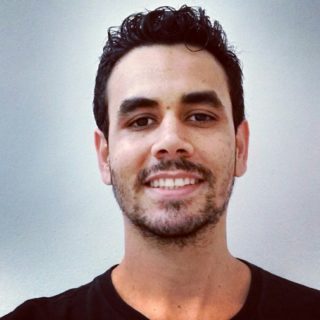12 years a slave
I was raised by my parents as a Catholic. Baptized, received Communion, confirmed. Played keyboard at church, was active in the Catholic Charismatic Renewal group.
As I grew up more and more involved with the church, a sense of pride grew on me, making me feel better than those around me. The church was imperfect, I thought, and I, special as I was, should search for something that was up to my holier standards.
In 2002, at 17 years old, I left my hometown to attend college in Cuiaba, 700 km away. For 3 years, I only attended one Mass, and it was not in a church, but in an auditorium at the college campus, thanks to some Catholic students who organized an event there.
In 2006, I left for Rio de Janeiro, 1,925 km away from Cuiaba, in a bus trip that took me 36 hours. There, I finally found what I was searching for: the “right” church for me. A Pentecostal church I thought was up to my standards, that was worth my time and effort. So I joined it, and gave it my best.
From 2006 to 2013, as a member of that church, I sang in the choir, played drums, taught kids in Sunday school, woke up early to pray, fasted, went to spiritual retreats, preached, visited, paid my tithe (literally 10% of my gross income, for years), and was very happy with almost everything.
Almost.
Being the genius that I always thought I was, and especially now, that I was a special servant of God, member of this church that was better than other churches, I thought to myself my life could only go up. I should have the best jobs, the best salaries, life should be comfortable, God should perform miracles through my hands, my preaching should convert dozens.
But it was not like that.
I worked in IT and only had great jobs, with decent salaries, however, it took me 3 years to be able to afford my first computer (a very bad one), and another year to finally afford a decent computer, but still I used my credit card and failed to pay the bills.
At some point I had debts with different banks, my salary was never enough for my expenses, even though I didn’t even have a car, didn’t party, barely bought clothes.
To make matters worse, at church I saw too many situations in which the most able people for certain tasks were never chosen to do them. Like in the choir, where only the leaders, who didn’t have great singing voices, were allowed to perform solos. Which would always make me think: “Why is this guy singing when we have that other guy available?” It was obviously pride and vanity that were at play, and I tried to convince myself that God was watching and had a plan.
In 2013, it all started to fall apart. First, our local pastor abandoned the church in the most dramatic way possible. The service was going normally. Then, when it was time for preaching, he announced he was leaving the church, and just left, without even ending the service, leaving all the attendees in shock, without even knowing what to do next.
Shortly after, the final blow came: a huge corruption scandal involving top leaders of the church broke out, with many of them being arrested, making national news.
I quit the church first. Later, I quit the faith entirely. That same year, I became officially an atheist.
“If I’m not rich and powerful but these guys are, then God can’t possibly exist.” That was my train of thought, in a nutshell. Because of this thought, I was ready to accept that when we die we just cease to exist, and then living and not living are exactly the same thing, that there’s no reward for being good and no punishment for being evil, and that the very concept of good and evil is made up.
So now I was alone. There was nobody that I thought was looking after me. If I wanted something, I had to take it myself. I should do what made me happy, as the only reward in this life was life itself, therefore it should be pleasant, and I should do only what was best for me.
Then, at the end of 2015, I met Shyrwyn, a non-practicing Catholic at the time, who had no strong experience with faith or religion, but didn’t call herself an atheist. She was curious about all the things God, and would ask me questions since I knew a lot about it. I would always answer her questions, looking at the Bible as a source of human wisdom. And I remember being impressed at how correct the Bible was in its teachings even when you remove the whole spiritual context from it.
Praying is good even if you don’t believe in it. Fasting is good even if you don’t do it for spiritual reasons. Living as if God exists is better for you even if you don’t believe.
At some point I started to think: “I wish I could believe again.” But I couldn’t believe. I couldn’t just push a button and all of a sudden dismiss the whole case I’ve been building against God all those years.
In 2017 my first child was born. Once she learned how to speak, Shyrwyn and I realized she had a problem being thankful. The smallest thing that didn’t go according to her wishes would make her feel sad, sometimes mad. I had no idea how to address that as an atheist, but I knew what a believer would do: make her pray every day, thanking God for what she has and what she likes.
And so we started to do exactly that. Every night, when it’s time for bed, we all hold hands, and then I ask everyone: “What did you like about today?” And then we thank “Heavenly Father” for those things “in Jesus’ name, amen.”
No preaching, no reading the Bible, no going to church. Other than praying before sleeping, God was not mentioned in our house.
Then, in 2025, Shyrwyn asked to start attending the Mass. I said yes, and we started going to church every Sunday. I expected my daughters, restless as they are, to be bored to death with the repetitive rituals typical of the Catholic celebrations. But that didn’t happen. Instead, my oldest daughter started to display genuine interest in Jesus, asking questions about him, even declaring “I like Jesus very much” and choosing Jesus as the theme for her 8th birthday.
I had never seen anything like it, not even among the children of the so many devout Christians I’ve met.
It was the turning point for me. After 12 years, I was back to the faith, unreservedly.
I used to think God had something big planned for me. Indeed, I was right about that; God had something big planned for me. My mistake was my definition of “big.” I wanted spectacle. I wanted to perform miracles, preach to multitudes, prophesy, be known, famous, rich, successful.
God wanted to save my soul.
I dismissed the salvation of my soul as a small thing, a detail, a simple requirement for the other stuff that I really cared about. In fact, it was the only thing I should have cared about: my soul, which is more valuable than the whole world.
What good is it for someone to gain the whole world, yet forfeit their soul?
Mark 8:36

